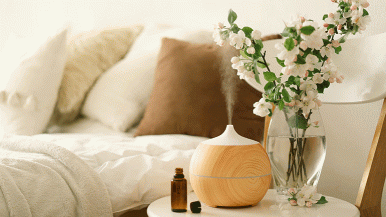In the last decade or so, essential oils and their many uses have exploded into the mainstream. Largely lauded as natural solutions for ills, spills and mental chill pills, word of their miraculous existence has spread online. Unfortunately, this is often done without addressing safety concerns or proper dilutions.
Essential oils can be pretty amazing, but they are not risk-free. For those undergoing cancer treatment, special care may be needed. So, let’s get into the essentials of essentials oils: What is aromatherapy and how does it affect the mind and body? How do you find safe and pure essential oils? How can they be safely incorporated into oncology care and everyday life?
About essential oils
Essential oils come from plants; however, not all plants contain essential oils. They are highly concentrated compounds that are released by distillation or pressing. While oily in substance, they are not true oils as they do not contain fatty acids.
It takes a lot of plant matter to make even one drop of essential oil. One hundred pounds of fresh lavender will produce one pound of lavender essential oil. One pound of rose essential oil requires two tons of Bulgarian roses!
While many equate plants to be all natural and thus safe, essential oils are incredibly concentrated. Your liver will process them just as it would any other medication that is applied topically or ingested. For this reason and because of risk to the soft tissues of the mouth, esophagus and stomach, you should never ingest essential oils.
Aromatherapy
Aromatherapy is the practice of using essential oils for therapeutic benefit. It integrates science, anatomy, physiology, chemistry and botany, as well as the arts, since it requires creativity with the blending of different scents.
In a quick anatomy lesson, the limbic system of the brain allows us to express our emotions and understand the emotions of others, while the cerebral cortex of the brain controls our behavior. The olfactory nerves, located in our nasal cavity, connect with various parts of the limbic system, which is why certain scents can affect how we feel emotionally and even help recall past memories. Smell is the only sensory information that is sent directly to the cerebral cortex and central nervous system. Inhaling essential oils can be a wonderful support during times of emotional upheaval.
When purchasing essential oils, it is important to ensure that the oil is pure and unadulterated. In the United States, there are currently no regulations in place for what can or cannot be allowed on essential oil labels. This means that any company can claim “100% pure” on their bottles regardless of facts. You can verify claims by checking for third-party testing — look for GC/MS (gas chromatography/mass spectrometry) reports on the company’s website. Each essential oil should have a GC/MS report and you don’t have to be able to read or understand the report. The mere fact that one exists will ensure purity and quality of the batch.
Follow safety protocols
Special care should be taken when incorporating aromatherapy as part of your complementary oncology care. Essential oils can be a fantastic tool to help during this time if you follow safety protocols.
Essential oils and anti-cancer effects
Limited but promising studies exist on possible anti-cancer effects of certain essential oils. However, these studies were done in-vitro in laboratories; they have not been done on humans. Also, the amount of essential oils used in these studies was significantly higher than what will safely be suggested here. Human studies have focused on helping improve quality of life, anxiety and side effects of cancer treatment.
Mood enhancers
Essential oils can be wonderful mood enhancers. These benefits occur by simply smelling the essential oil — sniffing the cap on the essential oil bottle (smelling from the bottle may be too potent for some), adding one drop to a tissue or using a diffuser or personal inhaler device.
When using a diffuser, halve the amount of essential oil called for in the directions. If the diffuser calls for eight drops, use only four. For a personal inhaler, only use seven to eight drops. This doesn’t seem like a lot, but remember how much plant material is in one drop. Too much can lead to headaches, dizziness and irritation of the membranes of the nose and lungs. It’s always smart to start low and slow.
Hydrosols
After essential oils have been extracted from various flowers, herbs and fruits, the distilled water that remains is called a hydrosol. It is not as concentrated as an oil but has similar properties. While undergoing active cancer treatment, using hydrosols topically on the skin instead of essential oils is recommended, as the likelihood of irritation will be greatly reduced.
If you choose to use essential oils topically, they must be diluted first in a carrier oil like jojoba or unscented lotion. You only need one drop per one ounce of carrier oil or lotion. Essential oils, even properly diluted, should never be applied over skin that is being radiated, including the entrance or exit points on the body. Some essential oils are phototoxic (as are many anti-cancer treatments) and will lead to unpleasant skin reactions after a short amount of time in the sun. To avoid unnecessary skin irritation or damage, do not apply citrus essential oils topically, especially lemon or bergamot.
Shelf life and storage
Every essential oil has its own shelf life and should be used within that time frame. A trusted company will have that information on its website. Essential oils can become irritating to the skin and membranes once they are past their prime. They need to be stored out of sunlight and away from heat to retain their integrity. Storage in the refrigerator will ensure their longevity and safety of use. Hydrosols must always be stored in the fridge for safety. As a result, they feel refreshing on the skin.
A complementary therapy
Aromatherapy can be a useful and beneficial complementary therapy to your oncology care. Inhalation of essential oils can help with anxiety, nausea and pain along with uplifting your mood. Be sure to follow the safety advice herein and then …
Just breathe.




